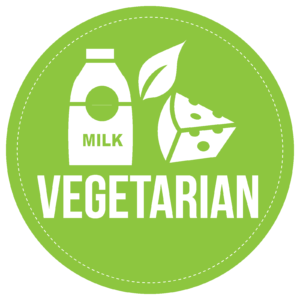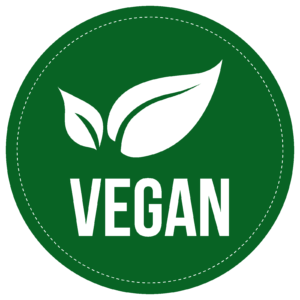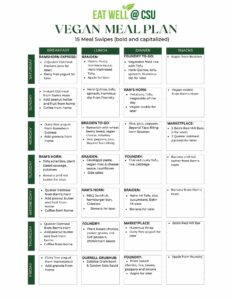VEGAN/VEGETARIAN OPTIONS

What is a plant-based diet?
A plant-based diet includes foods from mainly plant sources. A person who follows a plant-based diet consumes no animal flesh including pork, poultry, seafood, beef and insects, but can consume some dairy and egg foods based upon their diet. This includes all vegetarian and vegan diets.
Types of plant-based diets:
- Lacto-ovo vegetarian diets include eggs and dairy foods, but exclude all pork, poultry, beef, seafood and insects.
- Lacto-vegetarian diets include dairy foods, but exclude all pork, poultry, beef, seafood, insects and eggs products.
- Ovo-vegetarian diets include egg foods, but exclude all pork, poultry, beef, seafood, insects and dairy foods
- Vegan diets exclude all animal products including eggs, dairy, poultry, pork, beef, seafood, insects and honey.
The CSU vegetarian label is included on foods that meet the following criteria:
Do not contain animal flesh including pork, poultry, seafood, beef, gelatin and insects, but can contain some portions of dairy, eggs and honey.
The CSU vegan label is included on foods that meet the following criteria:
Contain no animal flesh including pork, poultry, seafood, beef, gelatin and insects or animal foods including those that contain any dairy, eggs and honey.
Quick Nutrition Tips
- Choosing a vegetable-based diet has been proven to have many benefits, including mental and physical. However, in order for a person to reap these benefits they must pay close attention to what they eat and the amounts in order to ensure adequate nutrition. As with any diet plan, eating a variety of foods is very important.
- Watch out for deficiencies in iron, zinc, calcium, and protein when following a vegetarian diet, and additionally vitamin D, vitamin B12, riboflavin, protein and even calories when following a vegan diet.
- Choose whole grains most often to get adequate amounts of b vitamins, zinc, iron, as well as other important vitamins and minerals.
- Have a good source of vitamin B12 either through fortified foods or supplements if following a vegan diet.
- If you don’t eat dairy foods, find alternative sources of calcium and vitamin d such as milk alternatives like soy and rice milks or dark leafy green veggies.
- Choose fewer sweets with added sugars as they provide minimal nutritional value.
- Remember to eat a variety of protein sources such as nuts, seeds, legumes, grains, soy, dairy and eggs. Try to compliment your vegan protein sources throughout the day in order to absorb the protein in foods to its fullest.
- Want to reduce your environmental footprint? Avoid environmental degradation caused by industrial animal farming by choosing plant-based meals (vegan and vegetarian) whenever possible.
If you have more questions, feel free to reach out to Registered Dietitian Nutritionist.
Sample Vegan Weeklong Meal Plan
Some ideas, based off of our Spring 2022 menu and retail offerings for a vegan student with a 15 swipe/week meal plan (vegetarians will have more options, including eggs and dairy).




